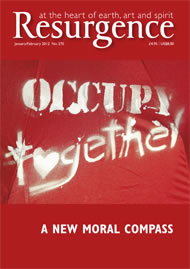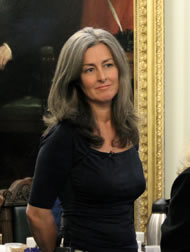The autumn of 2011 will go down in history as a time of political turmoil in the Middle East, instability in the world’s economic system, and record-breaking erratic weather conditions across the globe – but, most importantly, the time when the foundations of a “bridge to a new world’ were laid. This is no glib piece of rhetoric: the Ecocide Mock Trial, which was held in the UK’s Supreme Courts of Justice, played out a scenario where two chief executive officers of a fossil-fuel-based corporation were held to account for their business decisions, which had resulted in the destruction of ecosystems. Whilst these CEOs were played by actors, their real-life counterparts – think of the boss of BP presiding over the Gulf of Mexico oil spill, or the heads of Shell complicit in the ongoing Niger delta pollution – are real enough, and so too were the barristers: Michael Mansfield QC for the prosecution and Christopher Parker QC for the defence, allowing for a legally realistic examination of the facts.
In a packed courtroom, the mock trial heard the defence argue that the CEOs had acted quickly to clean up the oil spill, to which Michael Mansfield quipped, “It’s like saying we bombed Warsaw but they recovered,” adding that “companies cannot be given a licence to spill and kill, providing they clean it up.” Then, exposing how easy it is to subvert logic, Christopher Parker skilfully prised an admission from an expert witness oceanographer that in fact as a consequence of a fishing ban in the region of the oil spill, fish stocks had increased. But the wool could not be pulled over the jurors’ eyes as they handed back verdicts of guilty on two counts, to huge cheers and applause from those in the courtroom.
What this mock trial proves is that the moral imperative of protecting the Earth’s ecosystems must trump the economic imperative of business as usual, otherwise the outcome will be conflict – and conflict on the scale of genocide, war crimes, crimes of aggression and crimes against humanity, the four crimes against peace. Visionary barrister Polly Higgins argues that ecocide must become the fifth crime against peace because climate change, industrial deforestation, tar-sands oil extraction, dead zones in the oceans, and the myriad other environmental wounds inflicted on the Earth do indeed cause wars, conflict, suffering and extinction of species.
“We can no longer profit out of damage to the Earth,” says Polly. “We have to face the shadow self and give it a name, so that we can begin healing.” That shadow self in all of us is buying into a system that sows the seeds of our own destruction. Once we acknowledge that economic growth at the cost of a healthy environment is not a price worth paying, we begin a personal healing that will lead to a planetary healing.
But it is hard to extricate ourselves from a system where it is the law to put profit first without a thought to the consequences. “Our laws are no longer fit for purpose,” says Polly. “Ecocide would impose ‘superior responsibility’ on those people who take decisions that ultimately destroy the Earth, so that they are responsible for the consequences of their actions and business decisions.”
Recognising that many businesses and corporations operate within a paradigm that encourages profligacy, Polly advocates an ‘eco-amnesty’, which would give businesses and corporations a fixed time-span within which to change their operational structure to a sustainable and regenerative one. “This would be the largest job-creation scheme humanity has ever seen!” she says. “We have a brief window of opportunity to co-create a new world, but it is down to each and every one of us to propel ecocide to the top of every government agenda and to bring it to the table at the UN Rio+20 talks in June.
“There are only 86 people in the world who stand in the way of ecocide becoming the fifth crime against peace. They might be 86 heads of state, lobbied by vested interests and corporations, but if we shout loud enough, we will be heard.”
Like the ‘Occupy’ demonstrations against the corrupt banking system, and the voices of democracy from the Middle East, we can and must use our social networks and our voices to advocate a new world of environmental justice and peace.
You can support Polly’s work at www.eradicatingecocide.com Polly Higgins will be talking about the need to make ecocide a crime on Saturday, March 10 2012 in Gloucestershire as part of a Conversation Café Movement event (£11 inc a light lunch). To book call 01453 760999. She will also be a guest speaker at the Resurgence summer camp 2012. For more information and bookings: www.resurgence.org/summercamp







